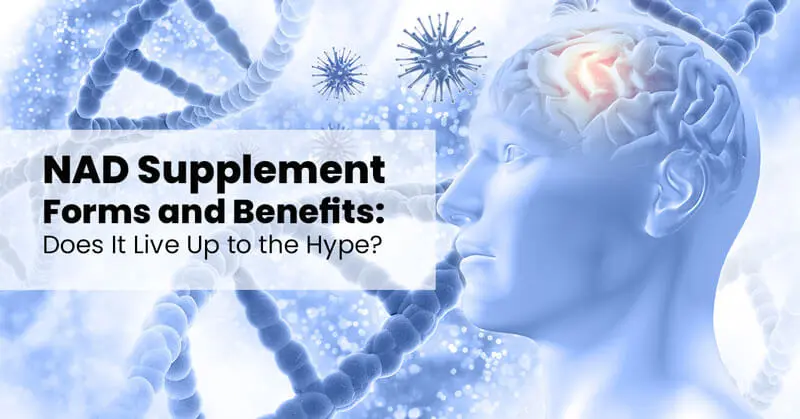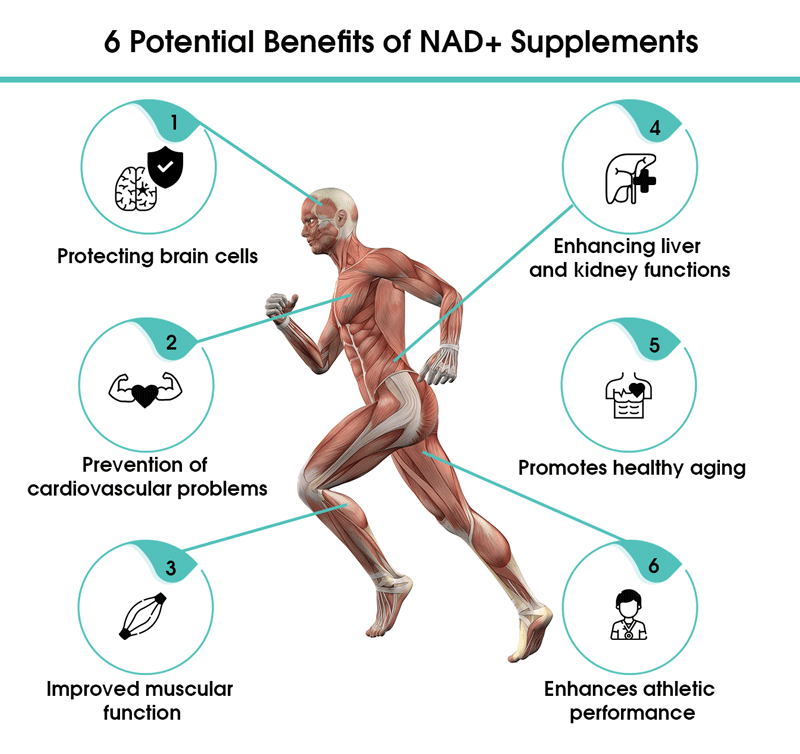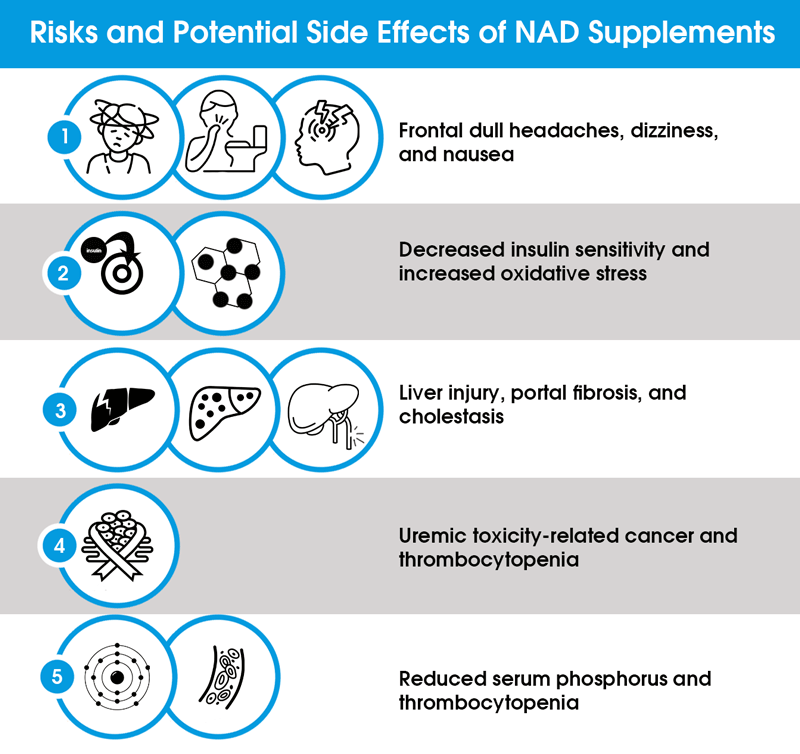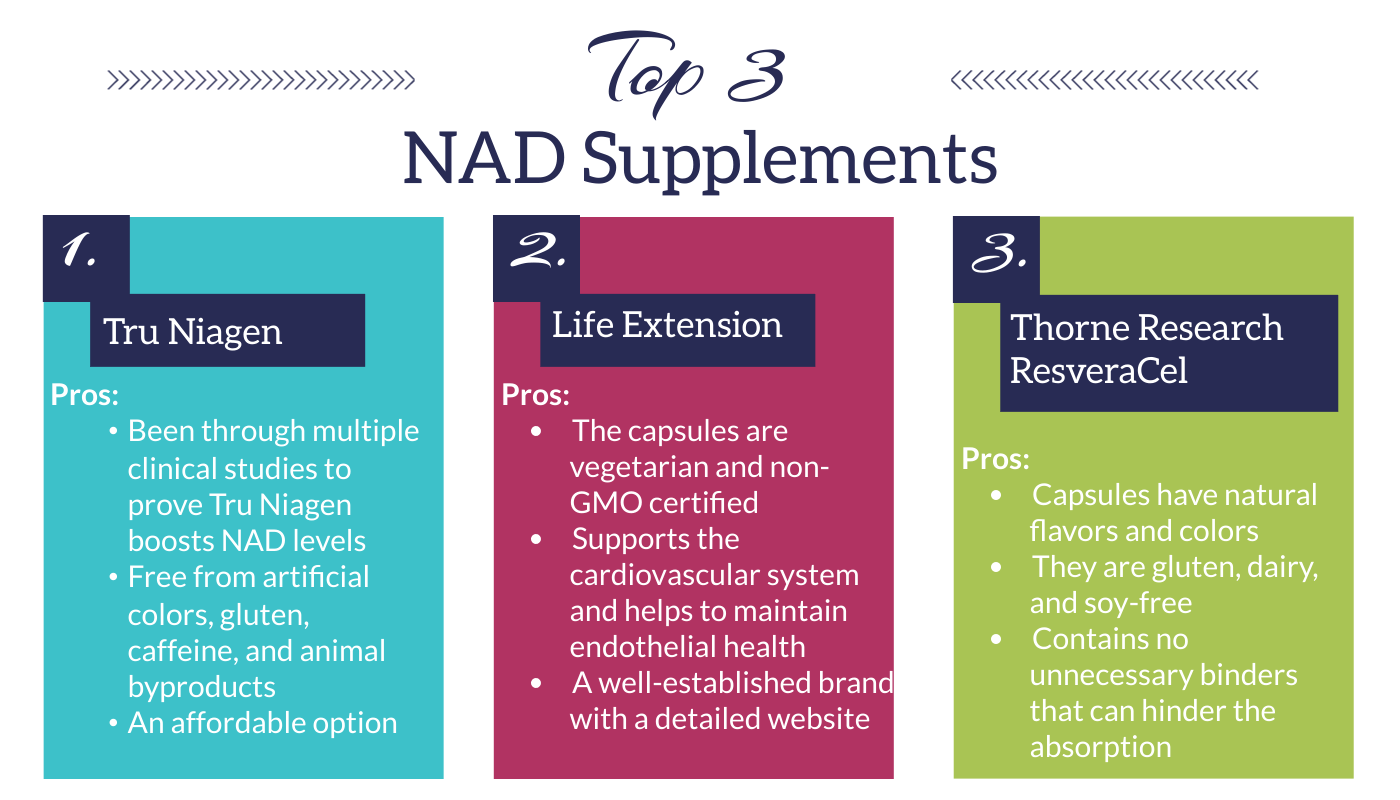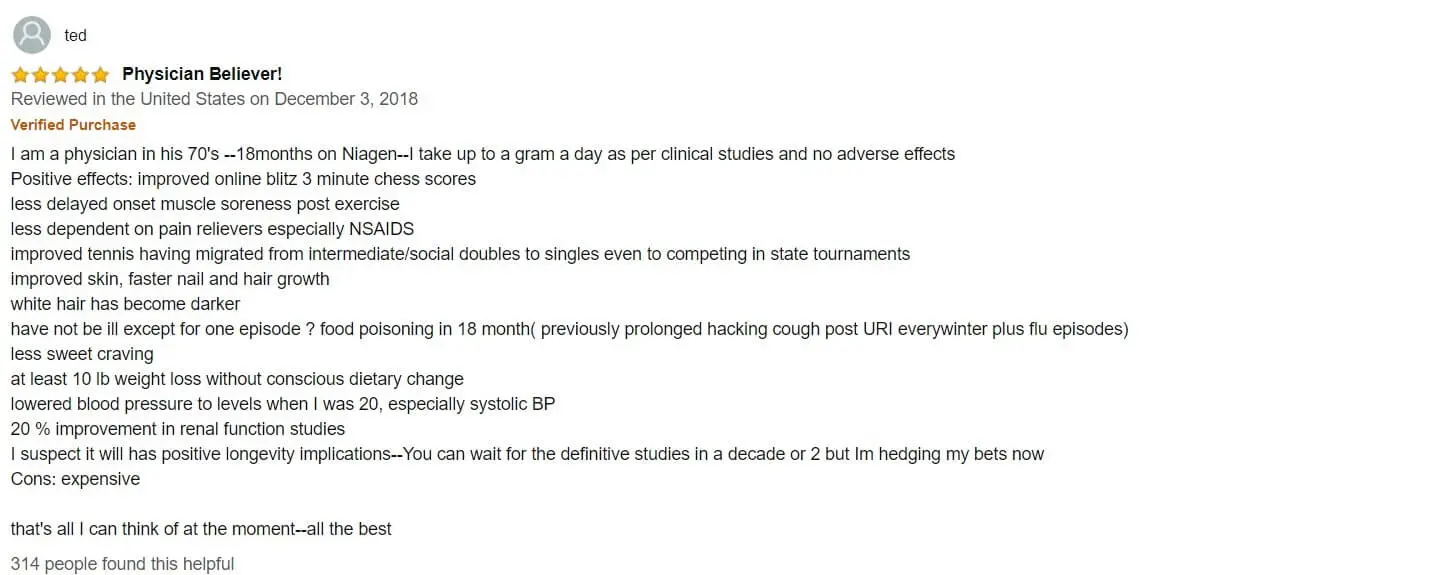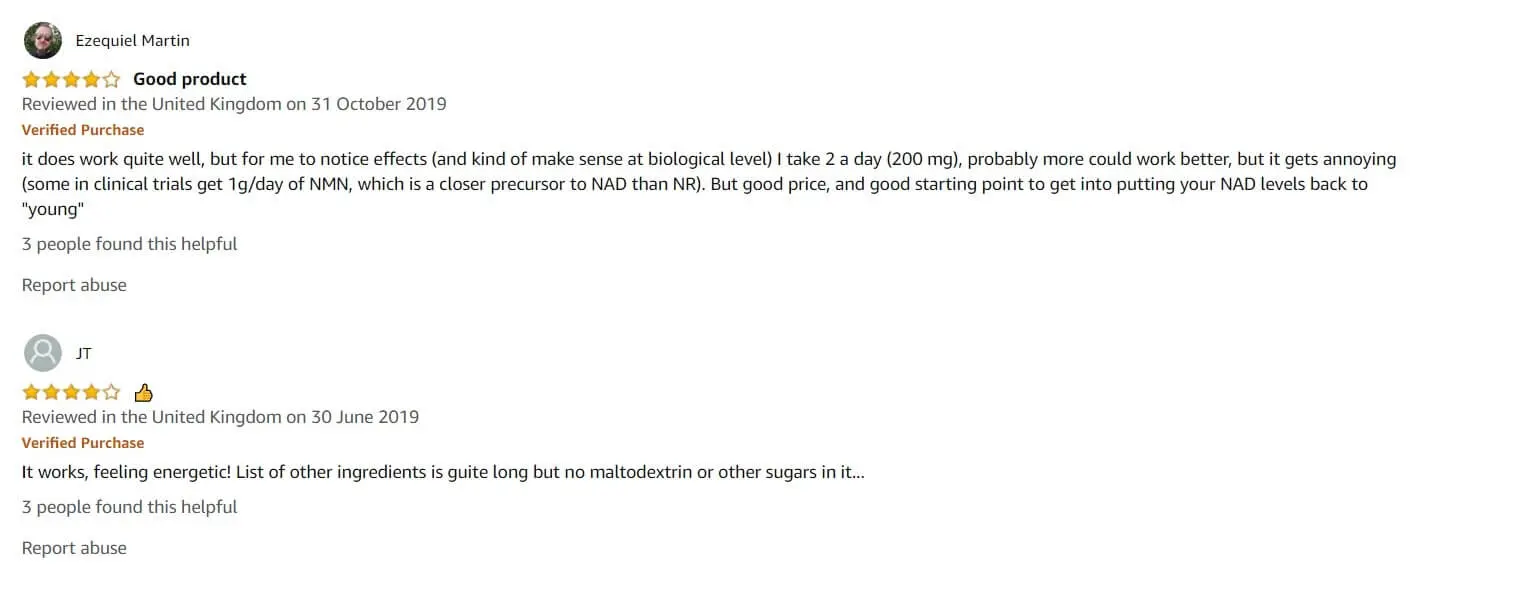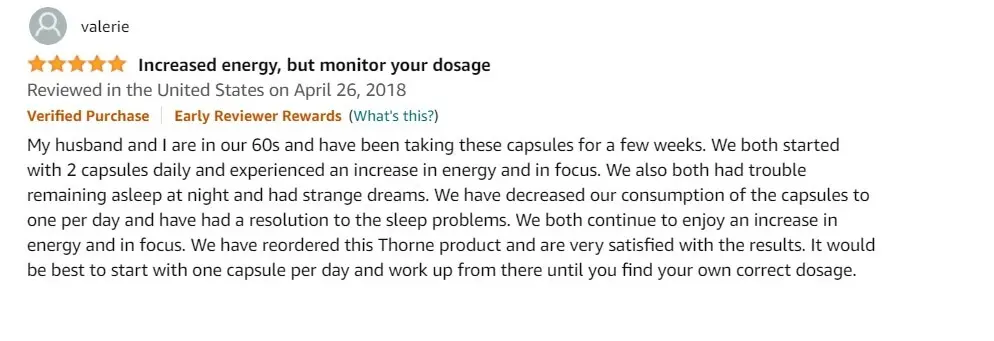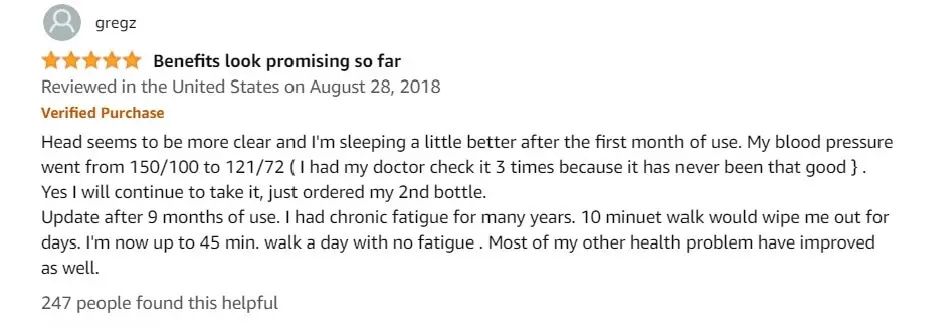Here is the question that many might ask: are NAD supplements the secret elixir that can grant us eternal youth?
Eternal youth might be a bit of a stretch, however, NAD is becoming known as the supplement that fights the signs of aging from the inside. But is it all that it’s hyped up to be?
Here, we will discuss the role of NAD supplements along with their benefits and risks.
Key Takeaways
- The two major forms of NAD in the body are NAD+ and NADH. Both of these assist in electron transportation and extracellular signaling.
- Nicotinamide riboside (NR) is the most common form used in NAD supplements.
- In short-term tests, no adverse effects were noted with dosage levels of 300 mg/day.
- The possible benefits of NAD supplements include maintaining brain cell health, reducing cardiovascular problems, and improved skeletal muscle functioning.
- Some of the popular NAD supplements in the market are Tru Niagen, Thorne Research ResveraCel, and Life Extension NAD+ Cell Regenerator.
NAD Supplements: Overview
The use of NAD as a preventive and therapeutic remedy for the effects of aging is an ongoing subject of research.
NAD supplements have shown the potential for boosting cardiovascular and other physiological performances in older adults [1]. They are also used to promote overall healthy aging.
Nicotinamide riboside or niagen is the most common NAD supplement used in the form of oral supplement. It is also a lesser-known form of vitamin B3. Some of the natural sources of NR include milk and beer [2].
What Is It
Since NAD carries hydrogen and electrons across cells, it plays a critical role in various oxidation and reduction reactions in the metabolic pathways of the body. It has a reduced form (NAD+) and an oxidized form (NADH).
Studies have also pointed out multiple NAD precursors:
- Nicotinic acid (NA)
- Nicotinamide (NAM)
- Nicotinamide mononucleotide (NMN)
- Nicotinamide riboside (NR)
NAD+ is the common form of NAD found inside the cells. It’s converted into NADH through the key biological processes of glycolysis and the Krebs cycle. NADH plays an important role in the production of ATP molecules in the cell. Note, both NAD+ and NADH are nucleotides and carry hydrogen and electrons for various chemical reactions.
Uses and Dosage
Being an intra-cellular electron transporter and an extracellular signaling molecule, NAD performs a key role in hundreds of tasks in the body. Some of the vital tasks include keeping the DNA healthy, DNA repair, energy metabolism, and even regulating the sleep/wake cycles.
Animal research on nicotinamide riboside supplements has indicated the lowest intake level that resulted in any side effects is 1000 mg/day. Some of these signs include fatigue, indigestion, nausea, headaches, and diarrhea.
At dosages of 300 mg/day during human trials, no signs of toxicity were noticed [3]. Other studies have proven that single oral supplementation with up to 500 mg of NMN is safe in healthy adults [4][5].
Forms of NAD Supplements
Among the common NAD+ and NADH boosters available on the market, both nicotinamide riboside and nicotinamide mononucleotide (NMN) are common. The most affordable supplementation option is a capsule containing a form of nicotinamide riboside that can be taken orally.
Niagen is the most popular form of NR supplement and is approved by the FDA as well as the European Commission. It is a form of vitamin B3, that has shown promise as an effective NAD booster. A few manufacturers also combine niagen with antioxidants for better protection against age-related diseases.
However, the efficacy and safety of NMN capsules still remain unclear. Some studies have also shown that NMN can not enter the cell directly and needs to be broken down into smaller components [6].
The popularity of intravenous vitamin drips that bypass the digestive system is on the rise. These are expensive treatments that claim to provide faster results than oral supplementation. That said, the effectiveness of this treatment is still not proven.
Benefits
Multiple benefits of NAD supplements are being promoted by various brands. In truth, much of the hype is not backed by proper research.
Potential Benefits of NAD+ Supplements
Here are some of the potential benefits that NAD+ supplements offer:
- Protecting brain cells
- Prevention of cardiovascular problems
- Improved muscular function
- Enhancing liver and kidney functions
- Promotes healthy aging
- Enhances athletic performance
Protect Brain Cells
A major role of NAD+ is to protect the brain cells from age-related brain disorders like Alzheimer’s and Parkinson’s. Apart from delaying the effects of these neurodegenerative diseases, NAD+ also helps in repairing damaged neurons and preserving brain health.
Supplementation with NAD+ can also reduce symptoms and improve the physical functioning of patients affected with Parkinson’s disease [7].
Impaired mitochondrial function is a major aspect of Parkinson’s disease. NR has shown to be effective in improving mitochondrial functioning in such patients [8]. Overall, it can be very effective in preventing neuronal loss. Still, more human research is required to point out the definite role of NR as a viable treatment.
Prevention of Cardiovascular Problems
Heart diseases are a major cause of death after the age of 65. The degeneration in the arterial linings and artery stiffness are some of the main reasons behind high blood pressure and related problems.
Animal studies have proved NMN can reduce oxidative stress and lessen arterial dysfunctions related to aging. It also improves blood flow through the microcapillaries to ensure proper oxygen supply. On the other hand, NR is effective in reducing both systolic and diastolic blood pressure levels [9]. It is also helpful in reducing stiffness in the aorta.
Improved Muscular Function
The skeletal muscle structure needs a significant volume of energy from glucose and fatty acids. Since NAD plays a vital role in cellular metabolism and energy production, it is important for muscle development and regeneration. Higher levels of NAD+ through dietary supplements can improve muscle health [10].
Besides, NAD+ also helps in conditions like sarcopenia. This is a condition where skeletal muscle mass and functionality deteriorates with age. Skeletal muscle mass also impacts metabolic health and body weight control. Boosting NAD levels can also help with metabolic conditions like type 2 diabetes and obesity.
That said, preclinical studies related to the functioning of NAD+ in cellular muscle compartments are still awaited.
Enhancing Liver and Kidney Functions
Certain enzymes related to the NAD+ signaling pathways protect the liver from fibrosis, insulin resistance, and other problems related to fatty liver diseases. Animal studies have shown that raising NAD+ levels can improve liver function and also help in the treatment of alcoholic steatohepatitis and obesity [7].
Reduced levels of NAD+ associated with aging can lead to reduced kidney function. Improved NAD levels through supplementation may improve renal performance in such scenarios.
Promote Healthy Aging
Decreasing NAD+ levels is regarded as one of the major causes of human aging, as well as all other species.
NAD+ activates enzymes that assist in healthy aging, so a boost in NAD+ levels can make a significant difference. Most research with older mice has indicated that higher NAD+ levels boosted their lifespan [7].
One important impact of reduced NAD+ levels is the decline in the activities of proteins called sirtuins, which play an important role in metabolic regulation. This can lead to aging and multiple age-associated diseases. Supplementation with NMN and NR can help in negating the negative effects [11].
Even so, more research is required to prove that higher NAD levels can treat, cure or prevent problems related to human aging.
Athletic Performance Enhancement
Muscles have a high energy demand during strenuous activity. Since NAD+ helps in regulating energy production in the cell mitochondria, it plays an important role in proper muscle functioning. Furthermore, enzymes related to glucose transport and fatty acid oxidation are dependant on NAD+ for proper functioning.
Being a signaling molecule, NAD+ promotes the generation of ATP, which is oxidized during exercise. The use of NAD supplements can be helpful in restoring the depleted reserves of NAD during heavy exercise.
Research done on mice has indicated supplementation with NR can improve exercise capacity, help in maintaining muscle mass, and reduce oxidative stress levels [14].
NAD+ Therapy
NAD+ therapy is thought to optimize the cell’s NAD levels for more immediate results compared to oral supplementation. Raising intracellular NAD+ levels has shown great promise in treating age-related diseases and extend the lifespan in animals.
Other potential benefits of NAD+ therapy include:
- Reduce depression
- Reduce anxiety
- Fight chronic fatigue
- Help with sleep disturbances
- Relieve autoimmune and inflammatory diseases
The ability of NAD+ to improve brain function, DNA repair, and cellular communication makes it an effective treatment for specific conditions.
The following conditions can deplete the normal levels of NAD+ in the body and affect physical performance:
- Alzheimer’s
- Parkinson’s
- Neurodegenerative diseases
- Chronic traumatic encephalopathy (CTE)
- Anxiety
- Post-traumatic stress
- Depression
- Drug or alcohol abuse
In most cases, an IV drip is used to introduce NR supplements to the body. The therapy also uses other healthy lifestyle practices, such as dietary changes.
Potential Benefits of NADH Supplements
NADH is said to have the same benefits as NAD+ supplements. Beyond that, it may have other positive effects on people suffering from a few other conditions. These include the following:
- Depression
- Jet lag
- Chronic fatigue syndrome
- Enhancing athletic performance
- Improving memory function and concentration levels
- Lowering cholesterol levels
- Opposing alcohol’s effects on the liver
- Protecting against side effects of the drug zidovudine (AZT) used to treat AIDS.
- Lowering of cancer risk
Note, the current evidence available for the effectiveness of NADH for treating these conditions is inconsistent.
NADH and Dementia-Related Diseases
Nicotinamide adenine dinucleotide is a helper molecule that promotes the growth and regeneration of the central nervous system.
In Alzheimer’s disease or senile dementia, the neuronal pathways into the brain are destroyed, resulting in cognitive decline. Besides, a lower level of specific enzymes that facilitate the conversion of NAD to NAD+ has been observed in patients with dementia.
As per some research, NADH can help in the case of neuronal degeneration in the hippocampus [12]. In addition, supplementation of NADH can improve the mitochondrial function inside the neurons.
Based on the completed clinical trials, NADH can be used for the treatment of dementia, however, long-term studies are required [13].
Risks and Potential Side Effects
Both NADH and NAD+ have been proved to be safe when consumed within the recommended dosage. Consuming 1000 to 2000 mg in a day showed no adverse effects in humans [4].
However, research on the long-term effects of NAD is limited. The extrapolation of animal research is not an effective method to predict the effect of NAD supplements on humans.
Research shows that different NAD precursors can have different effects. Some of the side effects of nicotinamide observed in subjects are listed below [15]:
- Frontal dull headaches, dizziness, and nausea
- Decreased insulin sensitivity and increased oxidative stress
- Liver injury, portal fibrosis, and cholestasis
- Uremic toxicity-related cancer and thrombocytopenia
- Reduced serum phosphorus and thrombocytopenia
Precautions
There is no detailed research on the effect of NAD on pregnant and breastfeeding women. Consult your healthcare provider before using nutritional supplements containing NAD.
Top 3 NAD Supplements
Tru Niagen
Each Tru Niagen capsule contains 150 mg of nicotinamide and riboside chloride. The serving size is 2 capsules. It claims to boost vitality and improves cellular energy levels. Other positive effects include defense against cellular stresses and enhanced cellular repair.
The supplement is manufactured by ChromaDex, which has collaborated with multiple leading scientists across universities and nutritional experts to ensure the safety of its product.
Read more about this popular supplement in our Tru Niagen review.
Pros
- ChromaDex has conducted multiple clinical studies to prove Tru Niagen boosts NAD levels, although these could be biased
- It is free from artificial colors, gluten, caffeine, and animal byproducts
- It is an affordable option
- The Food and Drug Administration has marked Niagen as Generally Recognized as Safe (GRAS)
Cons
- No definite data of the potential health benefits as research is ongoing
- Some users didn’t feel any difference after the use
Life Extension NAD+ Cell Regenerator
These capsules contain Niagen nicotinamide riboside and Resveratrol. The combination is said to provide a boost to cellular energy levels and vitality. By helping the body generate more energy, it helps in overcoming fatigue.
Each capsule contains 300 mg of Niagen and the recommended dosage is 1 capsule per day for healthy adults.
Life Extension has been around for 40 years and has multiple health supplements on the market. The supplement is developed by a team of clinical researchers that use cutting-edge research to develop health solutions.
Pros
- The capsules are vegetarian and non-GMO certified
- Resveratrol supports the cardiovascular system and helps to maintain endothelial health
- A well-established brand with a detailed website
- Claims to create a rise in NAD+ levels after 30 days of consumption
Cons
- No medical proof of its efficacy
- Users remarked that it is too expensive
Thorne Research ResveraCel Nicotinamide Riboside
ResveraCel contains a proprietary form of NR—nicotinamide riboside hydrogen malate—to boost NAD+ levels. It also includes Quercetin, Betaine, and Trans-Resveratrol, and it helps in cellular repair processes and also boosts energy metabolism rates. The serving size is 2 capsules daily.
Thorne has been delivering science-based products that promote health and wellness since 1984. The combination of multiple effective components makes this one of the most potent supplements that will help you to remain healthy with age.
Pros
- The capsules have natural flavors and colors
- They are gluten, dairy, and soy-free
- Contains no unnecessary binders that can hinder the absorption
- Thorne complies with the latest Good Manufacturing Practices (GMPs) of the FDA
- One of the best-reviewed products in the market
Cons
- Some users noted no significant changes
FAQ
Potential users have several queries related to NAD. We take a look at a few common ones.
What Is NAD Good For?
NAD helps in various bodily processes through multiple biological pathways. Some of its major benefits include promoting healthy aging, efficient energy metabolism, preventing DNA damage, assisting in cellular repairs, and supporting the functioning of the circadian rhythm.
Do NAD Supplements Work?
Till now, there is no direct proof that NAD supplements can help in reversing the aging process or provide other benefits. Also, they can not treat or cure any diseases. Further research is required to establish the facts.
How Can I Increase My NAD Naturally?
Some natural ways to boost NAD levels are exercise, consumption of foods rich in vitamin B3, and practicing intermittent fasting. It is best to consult a physician before making any dietary changes or following a new exercise regime.
Are NAD+ Supplements Safe?
As per the available research data, the consumption of NAD supplements within the specified daily limits is safe.
Conclusion
At present, there is a lot of enthusiasm about NAD and its role in reversing the process of aging. Plenty of evidence points to the fact that further research on NAD can lead to positive outcomes. However, unless the facts are established through scientific studies, there is no guarantee that NAD supplements can deliver the desired results.
Although they have not been identified, there might be potential risk factors associated with long-term NAD supplement use. Otherwise, you can try some natural steps to boost your NAD levels, like intermittent fasting and exercise.
References
- Martens, Christopher R., et al. “Chronic Nicotinamide Riboside Supplementation Is Well-Tolerated and Elevates NAD + in Healthy Middle-Aged and Older Adults.” Nature News, Nature Publishing Group, 29 Mar. 2018, www.nature.com/articles/s41467-018-03421-7.
- SJ;, Lee HJ;Hong YS;Jun W;Yang. “Nicotinamide Riboside Ameliorates Hepatic Metaflammation by Modulating NLRP3 Inflammasome in a Rodent Model of Type 2 Diabetes.” Journal of Medicinal Food, U.S. National Library of Medicine, pubmed.ncbi.nlm.nih.gov/25974041/.
- Turck, Dominique, et al. “Safety of Nicotinamide Riboside Chloride as a Novel Food Pursuant to Regulation (EU) 2015/2283 and Bioavailability of Nicotinamide from This Source, in the Context of Directive 2002/46/EC.” EFSA, John Wiley & Sons, Ltd, 7 Aug. 2019, efsa.onlinelibrary.wiley.com/doi/full/10.2903/j.efsa.2019.5775.
- Irie, Junichiro, et al. “Effect of Oral Administration of Nicotinamide Mononucleotide on Clinical Parameters and Nicotinamide Metabolite Levels in Healthy Japanese Men.” Endocrine Journal, The Japan Endocrine Society, 28 Feb. 2020, www.jstage.jst.go.jp/article/endocrj/67/2/67_EJ19-0313/_html/-char/en.
- Ratajczak, Joanna, et al. “NRK1 Controls Nicotinamide Mononucleotide and Nicotinamide Riboside Metabolism in Mammalian Cells.” Nature News, Nature Publishing Group, 11 Oct. 2016, www.nature.com/articles/ncomms13103.
- Rajman, Luis, et al. “Therapeutic Potential of NAD-Boosting Molecules: The In Vivo Evidence.” Cell Metabolism, U.S. National Library of Medicine, 6 Mar. 2018, www.ncbi.nlm.nih.gov/pmc/articles/PMC6342515/.
- Schöndorf DC;Ivanyuk D;Baden P;Sanchez-Martinez A;De Cicco S;Yu C;Giunta I;Schwarz LK;Di Napoli G;Panagiotakopoulou V;Nestel S;Keatinge M;Pruszak J;Bandmann O;Heimrich B;Gasser T;Whitworth AJ;Deleidi M; “The NAD+ Precursor Nicotinamide Riboside Rescues Mitochondrial Defects and Neuronal Loss in IPSC and Fly Models of Parkinson’s Disease.” Cell Reports, U.S. National Library of Medicine, pubmed.ncbi.nlm.nih.gov/29874584/.
- Martens, Christopher, et al. “NAA1 NICOTINAMIDE RIBOSIDE SUPPLEMENTATION REDUCES AORTIC STIFFNESS AND BLOOD PRESSURE IN MIDDLE-AGED AND OLDER ADULTS.” Artery Research, Atlantis Press, 1 Dec. 2017, www.atlantis-press.com/journals/artres/125930181.
- Goody, Michelle F, and Clarissa A Henry. “A Need for NAD+ in Muscle Development, Homeostasis, and Aging.” Skeletal Muscle, BioMed Central, 7 Mar. 2018, www.ncbi.nlm.nih.gov/pmc/articles/PMC5840929/.
- Imai, Shin-ichiro, and Leonard Guarente. “NAD+ and Sirtuins in Aging and Disease.” Trends in Cell Biology, U.S. National Library of Medicine, Aug. 2014, www.ncbi.nlm.nih.gov/pmc/articles/PMC4112140/.
- Fricker, Rosemary A, et al. “The Influence of Nicotinamide on Health and Disease in the Central Nervous System.” International Journal of Tryptophan Research : IJTR, SAGE Publications, 21 May 2018, www.ncbi.nlm.nih.gov/pmc/articles/PMC5966847/.
- G;, Demarin V;Podobnik SS;Storga-Tomic D;Kay. “Treatment of Alzheimer’s Disease with Stabilized Oral Nicotinamide Adenine Dinucleotide: a Randomized, Double-Blind Study.” Drugs under Experimental and Clinical Research, U.S. National Library of Medicine, pubmed.ncbi.nlm.nih.gov/15134388/.
- Frederick DW;Loro E;Liu L;Davila A;Chellappa K;Silverman IM;Quinn WJ;Gosai SJ;Tichy ED;Davis JG;Mourkioti F;Gregory BD;Dellinger RW;Redpath P;Migaud ME;Nakamaru-Ogiso E;Rabinowitz JD;Khurana TS;Baur JA; “Loss of NAD Homeostasis Leads to Progressive and Reversible Degeneration of Skeletal Muscle.” Cell Metabolism, U.S. National Library of Medicine, pubmed.ncbi.nlm.nih.gov/27508874/.
- Hwang, Eun Seong, and Seon Beom Song. “Possible Adverse Effects of High-Dose Nicotinamide: Mechanisms and Safety Assessment.” Biomolecules, MDPI, 29 Apr. 2020, www.ncbi.nlm.nih.gov/pmc/articles/PMC7277745/.
- Airhart SE;Shireman LM;Risler LJ;Anderson GD;Nagana Gowda GA;Raftery D;Tian R;Shen DD;O’Brien KD; “An Open-Label, Non-Randomized Study of the Pharmacokinetics of the Nutritional Supplement Nicotinamide Riboside (NR) and Its Effects on Blood NAD+ Levels in Healthy Volunteers.” PloS One, U.S. National Library of Medicine, pubmed.ncbi.nlm.nih.gov/29211728/.
